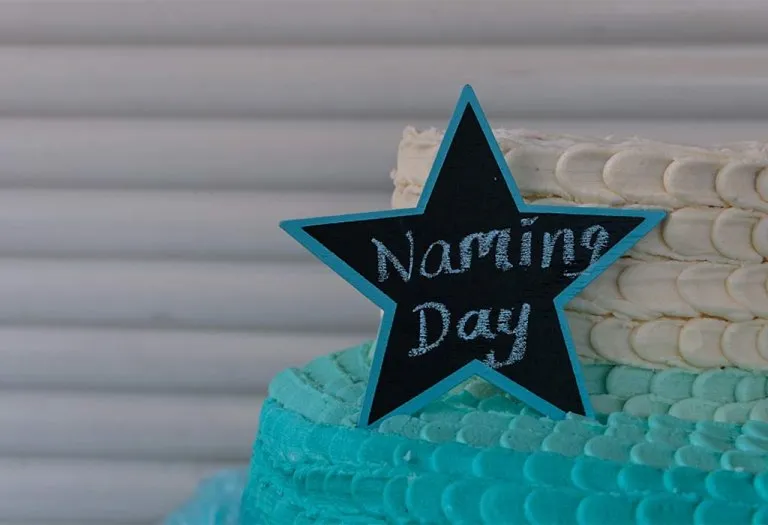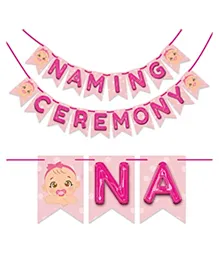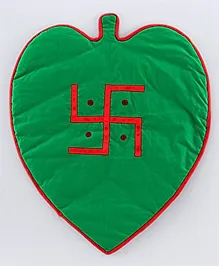Baby Naming (Naamkaran) Ceremony – What It Is and How to Perform It?
- What Is Naamkaran?
- When and Why Is It Done?
- Where and How Is Naamkaran Sanskar in Hindu Tradition Performed?
- Choosing the Right Name for the Baby
- The Official Name and the Astrological Name
- Gifts That Are Appropriate for a Naamkaran Ceremony
- Tips to Keep Baby Safe During This Ceremony
A baby naming ceremony or naamkaran ceremony holds significant cultural and spiritual importance in many societies, marking the introduction of a newborn baby into the community with reverence and tradition. The ceremony often involves rituals steeped in symbolism, reflecting the family’s beliefs and values. Family elders may play a key role in selecting the name, considering factors such as ancestry, auspiciousness, and religious significance. These ceremonies serve not only as a celebration of new life but also as a reaffirmation of cultural identity and familial bonds, fostering a sense of belonging and continuity across generations. Read on for some lovely baby naming ceremony ideas at home.
What Is Naamkaran?
Naamkaran or naming ceremony is a Hindu tradition and is one of the most significant of the 16 Hindu ‘samskaras’ or rituals. ‘Naam’ means ‘name’, and ‘karan’ means ‘to create’, in Sanskrit. In some traditions, namkaran ceremony is also called ‘palanarohan’, which means to put a child into the cradle. In Sanskrit, ‘palana’ means ‘cradle’, and ‘arohan’ means ‘on board’. This function not only has a religious significance but also has legal and social importance.
When and Why Is It Done?
Traditionally, the naamkaran ceremony is held within a few weeks of the baby’s birth. Ideally, the naming ceremony function is performed 11 days after birth, just before the ‘Sutika’ or ‘Shuddhikaran’ period, during which the mother and child are given intensive post-natal care. Therefore, the eleventh or twelfth day after birth is declared the most auspicious day for the ceremony. Nevertheless, the eleventh day is not mandatory, and the parents can choose any day based on their priest’s or an astrologer’s advice. Hence, the naamkaran ceremony may be scheduled anytime after the tenth day, and before the baby’s first birthday. The naamkaran ceremony is performed to give the newborn a name and an identity. The rituals conducted during the ceremony are to seek blessings for the newborn for his good health and a long and prosperous life ahead. His horoscope is also prepared on this day.
Where and How Is Naamkaran Sanskar in Hindu Tradition Performed?
The naamkaranvidhi can be performed at home or in a temple. The choice lies with the family, and the practices followed in the community. While some may celebrate it on a grand scale in a special banquet hall or tent (pandal) with a large gathering, others may opt for a small private ceremony with close family. A pandit performs the naamkaransanskar. He decides an auspicious day and time of the naming ceremony, also called the ‘Shubh Mahurat’. A puja or havan is conducted, wherein prayers are offered and mantras are chanted for the well-being of the newborn. He also creates a horoscope for the baby.
Rice grains are spread on a bronze dish or thali, and the father writes the newborn’s name on it with a gold stick. The grandfather or uncle can perform the rituals in the absence of the father. The chosen name is then whispered into the baby’s right ear by the father four times, along with a prayer. In some families, the aunt (father’s sister) of the baby whispers the baby’s name in his ears, following which it is announced to family and friends.
In certain communities, the auspicious ceremony is performed in the presence of at least five married women. These women are responsible for conducting various rituals as per the Hindu customs, like singing songs for welcoming the baby. In some families, the newborn baby is placed in the cradle, and the family members take turns to rock the cradle and bless him. The ceremony is then concluded with a special feast for the guests.
Choosing the Right Name for the Baby
Hindus believe that the meaning of a child’s name influences his character and shapes his destiny. They also believe that if the name of the newborn is not in sync with the planet’s position, it can bring the child bad luck. So, choosing the right name for the baby is very important. Pandits usually advise conducting a naamkaran by the date of birth, or sun sign or rashi. So, based on the child’s birth date and time, a particular letter associated with the rashi is selected, and a name starting with that letter is given to the baby. This is believed to bring good luck for the baby.
As per Hindu tradition, the initial letter of the name is also important and is selected based on the ‘Janam Nakshatra’ or star under which the child is born, the moon sign, and the planetary placement at the moment of birth. A name can also be chosen according to the deity who is believed to preside over the birth month, or after an ancestor. In general, there are five naming principles which are followed: Janam Nakshatranam (by lunar asterism), Devatanama (after the family deity), Masanam (the birth month), Samsarikanama (the worldly name), and Rashinama (zodiac sign).
The Official Name and the Astrological Name
Some parents like to keep the astrological name private based on their comfort level. The name chosen during a naamkaran ceremony becomes the official name. But nowadays, an official name is selected, and also a shortened version, by which the child will be addressed at home. This may be done by combining the names of the parents. Some communities believe that a boy’s name should contain an even number of Sanskrit letters (2, 4, 6, and 8) and a girl’s name, an odd number of letters (3, 5, 7, and 9). 11 is a number which is considered auspicious for both genders.
Gifts That Are Appropriate for a Naamkaran Ceremony
On the occasion of the child naming ceremony, people shower their blessings on the newborn in the form of gifts. Different kinds of gifts can be given, depending on the relationship with the family and the budget. Gifts can also be selected keeping in mind the requirements of the baby. A few gift ideas are:
- Gold and silver ornaments
- Gold and silver coins
- Gift coupons
- Cash
- Toys
- Baby accessories like cots, bathtubs or prams
- Clothes
- Beddings/blankets
- Utilities for the baby like soaps, shampoos, wipes etc.
- Gift hampers
- Books
Tips to Keep Baby Safe During This Ceremony
Ensuring the safety of your baby during the naming ceremony is paramount. By implementing a few key strategies, you can create a secure environment where your little one can participate in the joyous occasion without unnecessary risks. From careful supervision to thoughtful planning, these tips will help you navigate the ceremony with peace of mind, knowing that your baby’s well-being is safeguarded.
1. Supervise Closely
Assign trusted family members or friends to keep a watchful eye on the baby throughout the ceremony, ensuring they are always within sight and reach.
2. Create a Safe Space
Designate a designated area where the baby can safely rest or play during the event, away from potential hazards or crowded areas.
3. Limit Handling
Encourage guests to refrain from unnecessary handling of the baby to minimize the risk of accidental injuries or exposure to germs.
4. Secure Decorations
Ensure that any decorations or ceremonial items are securely fastened and out of reach of the baby to prevent choking hazards or accidents.
5. Keep Cords and Wires Away
Be mindful of electrical cords or wires for audiovisual equipment or decorations, tucking them away or securing them to avoid tripping hazards or entanglement.
6. Monitor Food and Drink
If food and beverages are served, be cautious about potential allergens or choking hazards, and keep them away from where the baby is positioned.
7. Plan for Comfort
Have a quiet and comfortable space nearby where the baby can nap or feed if needed, ensuring their basic needs are met throughout the ceremony.
8. Prepare for Emergencies
Keep a first aid kit handy and know the location of emergency exits in case of unexpected situations, prioritizing the safety and well-being of the baby above all else.
Baby naming or naamkaran is a very special way of celebrating the arrival of the newborn into the family. It’s a way of showering him with blessings according to the rituals and traditions, thereby cementing a good and prosperous future for him.
Also Read:
Baby Mundan Ceremony
Godh Bharai (The Indian Baby Shower) Ceremony
Annaprashan Ceremony (First Rice Eating Ceremony)
Was This Article Helpful?
Parenting is a huge responsibility, for you as a caregiver, but also for us as a parenting content platform. We understand that and take our responsibility of creating credible content seriously. FirstCry Parenting articles are written and published only after extensive research using factually sound references to deliver quality content that is accurate, validated by experts, and completely reliable. To understand how we go about creating content that is credible, read our editorial policy here.





















.svg)


















